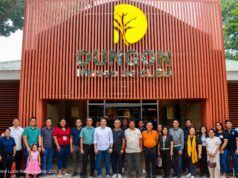I WAS watching the NETFLIX six-part series “Coming out Colton” when it dawned on me that unlike former National Football League player and “Bachelor” star Colton Underwood, I never had one brief, shining, melodramatic coming-out story that could give those trending “grand reveal” parties on social media a run for their money.
Consider this context – it was the mid-70s going through the late 80s, growing up in a highly conservative Catholic family from one of Pampanga’s oldest towns, being the youngest in a family of nine with four older brothers, having a public school principal for a father and living in an era that ostracized, ridiculed or regarded gay people simply as some sort of a comic relief in private gatherings, a stereotype that translated in the movies and on television for as long as I could remember.
Given this background, one might think I was among those who were hanged from a tree, submerged in a drum of water, became the father’s favorite punching bag in a drunken frenzy of rage and disappointment or forced to recite a litany of prayers on bended knees in front of the altar until I was cured of an “illness” and decided to be “normal.” Nah! I never went through any of those traumatic experiences. My story was different.
Even at a young age, I knew I was gay. My own family knew that I was gay. There was not even an iota of need to come out to them. Despite this silent acceptance, I was treated like the rest of my siblings. I was praised and appreciated for whatever good thing I accomplished at home or in school; and I was also reprimanded for any unruly act or behavior that went against our parents’ unwritten rules. I was allowed to do things that made me happy. It was not only an accepting environment I grew up in; there was this nurturing spirit that allowed me to pursue my own interests, but guided constantly by the reminders and rules that my family laid to me as I ventured into the world outside.
I was about to enter college when one of my brothers told me, “Tandanan mu, byasa kang dili kekami ngan. Ali mu paburen ing gawan da kang pikatulan reng aliwang tao. Ika dapat ing mumunang mamye respetu keng sarili mu.”
To this day, these words resonate with so much truth as the day I first heard them. Growing up, I chose my friends carefully. My BFF Rani and I grew up under the wings of our fairy gay mothers who allowed us be the “errand girls” in their beauty parlors but discouraged us from learning any trick of the trade. Their selfless reason? If we did well in our studies, our future would be a lot better than theirs. To them, the beauty parlor was simply too small for our potentials. In the absence of a Boy Abunda, or an Anderson Cooper as good gay role models to look up to during that particular episode in my life, I listened to my fairy gay mothers’ own dreams, struggles, frustrations, and regrets and vowed to myself that my life story would be different and would have a happier ending. They encouraged us to study well and earn a degree, a personal dream that they never got the chance to fulfill.
After college, I had the chance to work in a government agency, teach Economics at UP, work as operations manager in a universal bank, and now serve as the school director of a Catholic archdiocesan school. In all these work environments, I never made my being gay an issue. I put my all into my job and made sure that the people I work for and the colleagues I work with saw, appreciated and valued my dedication, and the kind of work I bring on the table; and never about my personal life.
I grew up not wearing make-up, sporting a longer hair or parading in female clothes because that is not me. Not even once have I thought of going through a medical procedure to embrace the femininity inside me. This is not to say that I despise gay people who do that. In fact, I have nothing but the greatest of admiration and respect for my LGBTQIA+ friends who have chosen that challenging but liberating lifestyle. People should always remember that just as there are different kind of men and women, there are also different kind of gay people who choose a lifestyle that they are most comfortable with and a path that they find most fulfilling.
In many of our previous family gatherings, my Imang Onyang would be asked who among her children is the prettiest and she would say, “Ing bunso, I Rey!”
But she would always end this with her infamous caveat, “Pero ing buri ku, bayu ku man mate, makapakyasawa ya.” Suffice it to say that I opted not to fulfill this one last wish of my Imang Onyang.
They say that mothers are the first to know but the last to admit. Well, this pretty sums up my own coming-out story – no dramatic confrontations, no kilometric dialogues straight from a Star Cinema movie, no emotional hang-ups, rants and telenovela “hugots.” Just pure, embracing, selfless and unadulterated love that only a mother, and an entire family could give.





